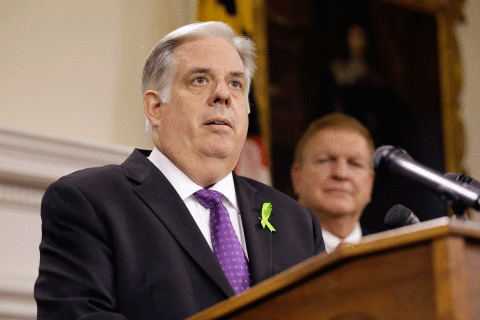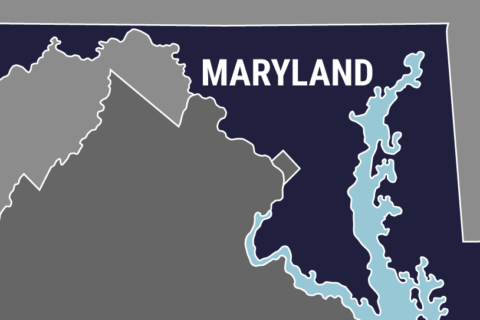WASHINGTON — Maryland Gov. Larry Hogan has made it clear he will not support the man at the top of the Republican ticket for president, and it has done little to hurt his popularity or reputation in the state.
In fact, it may have helped.
The latest Washington Post-University of Maryland poll finds that Hogan now has a 71 percent approval rating, an improvement over the 66 percent approval rating he received in April’s poll.
That support is widespread, with the least support coming from liberals. Still, 59 percent of liberals say they approve of the Republican’s work.
“He’s a very moderate Republican, which is very hard to find these days,” University of Maryland political science professor Stella Rouse told WTOP. “And the fact that he has come out so strongly in saying that he is not going to vote or support Donald Trump certainly helps him in a state like Maryland.”
The numbers bear that out.
Respondents were split about whether Hogan was a “different type” of Republican or a “typical” Republican. In the poll, 45 percent said the former and 40 percent the latter.
But with almost every group, regardless of the label they applied to the governor, respondents saw it as a positive attribute. Liberals who called Hogan a typical Republican viewed that as a negative.
It was a completely different story for Republican presidential nominee Donald Trump.
Almost 80 percent of Marylanders labeled Trump a “different type” of Republican.
Regardless of the label given, almost every responding group said it was a negative attribution. The only positive attribution came from conservatives who said it was good that Trump was a “different type” of Republican.
“It doesn’t hurt him [to be against Trump] in a state like Maryland where the Republican Party is sort of having an identity crisis at the national level,” said Rouse.
But the governor’s popularity hasn’t trickled down to other Republican candidates for office.
In that same poll, Democratic Rep. Chris Van Hollen (D) maintains a hefty 58 to 29 percent lead over his Republican challenger Del. Kathy Szeliga in the race to replace Democratic Sen. Barbara Mikulski.
“Szeliga hasn’t distanced herself away from Trump the way Hogan has,” Rouse said. “Particularly for more conservative candidates, I think it’s going to be even less of an effect.”
The other consideration is that Van Hollen is just better positioned in this race to see success.
“Van Hollen just has so much institutional structure: name recognition, having been in Congress, a lot of support among Marylanders,” Rouse explained.
The top challenge Rouse sees for Republicans in Maryland is battling what she calls the “national identity crisis” the party is dealing with. Added to that is the much more liberal and moderate statewide electorate in Maryland.
“Candidates have made their names more conservative in local elections,” Rouse noted. “So now you are running as a statewide candidate that has to appeal to a primarily blue constituency.”
Hogan has been able to do that successfully, Rouse said.
“He was appealing to his base, particularly on economic issues, but leaving social issues alone which he knows are very popular with ‘blue’ constituents,” Rouse said. “It’s difficult for other candidates to do that.”
The Washington Post-University of Maryland poll was conducted Sept. 27 to 30. A random sample of 906 Maryland adults contacted on cellphones and landlines participated in the survey. The margin of error is plus or minus 3.5 percentage points.






